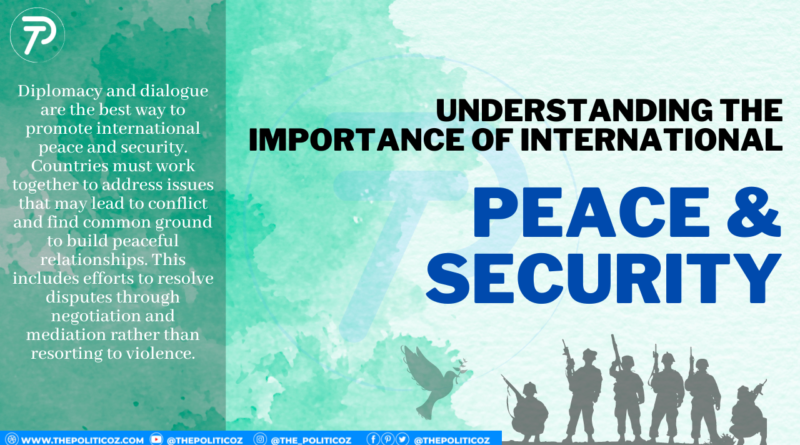Understanding the Importance of International Peace and Security
Introduction:
It is a vital issue that affects every nation and every person on the planet. The world is facing many challenges that threaten peace and security, including terrorism, weapons of mass destruction, and cyber-attacks.
Diplomacy and dialogue are the best way to promote international peace and security. Countries must work together to address issues that may lead to conflict and find common ground to build peaceful relationships. This includes efforts to resolve disputes through negotiation and mediation rather than resorting to violence.
Another critical aspect of it is the role of global organizations such as the United Nations. The UN was established in the aftermath of World War II to prevent another such devastating conflict. It has played a critical role in maintaining peace and security through peacekeeping missions, sanctions, and other measures.
However, the UN and other international organizations are only as effective as the member states that support them. Strong, effective leadership is essential for the UN and other international organizations to carry out their mandate and promote peace and security worldwide.
Another important aspect of this is the fight against terrorism. Terrorism threatens the safety and security of people worldwide, and it is a top priority for many countries. Strong international cooperation is needed to combat terrorism, including sharing information and intelligence and working together to disrupt terrorist networks and financing.
In addition, preventing the spread of weapons of mass destruction is crucial for international peace and security. Using nuclear, chemical, and biological weapons could have devastating consequences for the entire world. Therefore, countries need to work together to prevent the spread of these weapons and eliminate them where they exist.
Finally, cyber security is increasingly important in international peace and security. Cyber-attacks can cause significant damage to critical infrastructure, disrupt economies and steal sensitive information. Countries must work together to develop strategies and policies to protect against cyber-attacks and respond to them.
In conclusion, international peace and security is a complex and multi-dimensional issue that requires a comprehensive approach. Diplomacy, solid international organizations, the fight against terrorism, prevention of the spread of deadly weapons, and cyber security are all vital aspects of ensuring peace and security worldwide.
Significant threats to international peace and security:
There are several major threats that countries and international organizations must address. Some of the most significant include:
- Terrorism: Terrorism continues to be a significant threat to peace and security worldwide. Terrorist groups such as ISIS and al-Qaida have carried out attacks in many countries, killing and injuring thousands of people. The threat of terrorism is also increasing as extremist groups use the internet to spread their message and recruit new members.
- Nuclear Proliferation: The proliferation of nuclear weapons remains a primary concern for international peace and security. Countries such as North Korea and Iran have been developing nuclear weapons, despite international sanctions and efforts to prevent them from doing so. The risk of a nuclear war or terrorist attack is a significant concern, and efforts must continue to be made to avoid the spread of atomic weapons.
- Cybersecurity: Cyber-attacks are becoming an increasingly significant threat to it. Cybercrime can cause considerable damage to critical infrastructure, disrupt economies, steal sensitive information, and be used as a tool of warfare. The increasing interconnectivity of networks and systems makes the world more vulnerable to cyber-attacks, and countries must work together to protect against them.
- Climate Change: Climate change is also becoming a significant threat to international peace and security. It is causing extreme weather events, droughts, and food and water shortages, which can lead to conflicts over resources and mass migration. Climate change also disproportionately impacts vulnerable communities and can exacerbate existing conflicts.
- Regional Conflicts: Regional conflicts, such as the ongoing conflict in Syria, Yemen, and Afghanistan, continue to pose a significant threat to international peace and security. These conflicts have led to mass displacement and widespread human rights violations. They can also destabilize neighbouring countries and create opportunities for terrorist groups to gain a foothold.
- Arms Trade: The illegal and unregulated arms and ammunition trade is also a significant threat. It fuels armed conflicts, undermines the rule of law, and leads to widespread human rights abuses.
These are some of the significant threats to international peace and security. Still, it is essential to note that there are many others. Countries and international organizations must work together to address these threats and promote peace and security worldwide.
Shoeb Hassan | Writer is Political Science Graduate from Karachi University.






